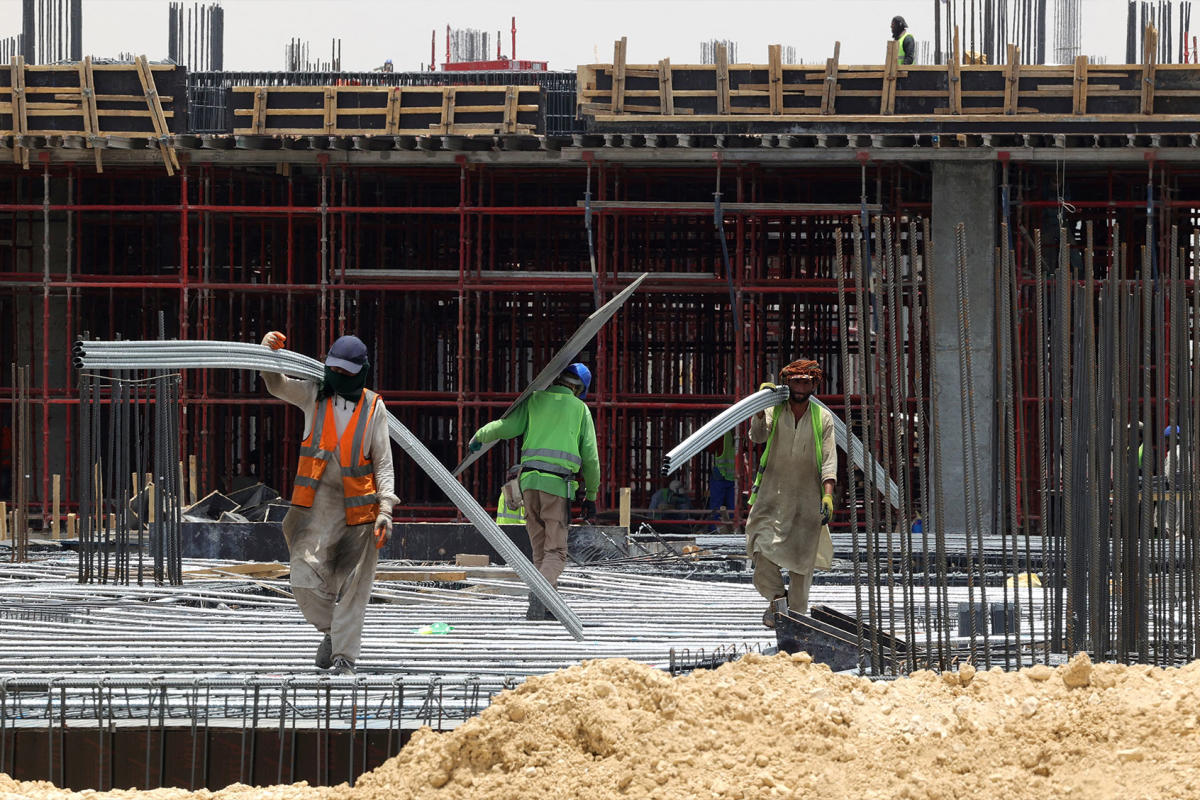A human rights watchdog group accuses Saudi Arabia of systematically violating the dignity of migrant workers. They say the kingdom is failing to meet stated human rights demands of football’s world governing body, despite likely hosting the 2034 World Cup.
In a report released Tuesday, human rights organization Equidem reveals what it says are significant human rights and labor violations for migrant workers in the hospitality, maintenance and construction sectors. After a high level of abuse by migrant workers came to light ahead of the 2022 FIFA World Cup in Qatar, the group warns that FIFA could be on the verge of choosing yet another host that fails to protect the rights of migrants .
Saudi Arabia was the only country to bid in time for the 2034 World Cup.
“The report raises one simple question: how on earth can FIFA seriously consider Saudi Arabia to host its major event, given its human rights record?” Equidem CEO Mustafa Qadri said this at a press conference on Tuesday.
Other organizations, including Amnesty International and Building Wood Workers International, have similarly warned of potential human rights abuses if Saudi Arabia were to win the bid.
Migrant workers make up 37.3% of Saudi Arabia’s population — the third largest migrant population per capita in the world — but the country offers them very little protection. Saudi Arabia uses the ‘kafala’ system, which gives private citizens and employers complete control over the lives of migrant workers through a binding contract. Migrants are excluded from any legal framework or human rights protection; Many have equated the kafala system with modern slavery.
Through one-on-one interviews with dozens of migrant workers, Equidem researchers found that 70% of migrant workers were misled about employment terms and conditions, 42% said they faced discrimination based on nationality by their employer and 35% reported that there was no mechanism to file complaints about their workplace.
“What is currently happening in Saudi Arabia can be addressed. We are not talking about earth-shattering solutions. But the inability to address these issues is something we should all be very concerned about,” Qadri said.
The country has an extensive history of human rights violations and criminalization of human rights defenders. Human rights organizations cannot operate in the country either. This makes it difficult for FIFA to fully assess the potential risk of abuse by migrant workers, which should be a key condition for approving Saudi Arabia’s bid, Saudi human rights activist Lina al-Hathloul said at the press conference.
“To demonstrate its fair and sincere willingness to respect its human rights obligations, FIFA must ensure that the key risks associated with the bid are fully addressed,” she said. “This would include releasing all political prisoners before the events, lifting all restrictions, including travel bans, on human rights defenders and their families, decriminalizing freedom of association and assembly, and allowing human rights organizations to freely to operate without fear of defamation, prosecution or reprisal.”
FIFA did not immediately respond to Salon’s request for comment.
Martha Waithira, a former migrant worker in Saudi Arabia and now a researcher at Equidem, has experienced workplace abuse firsthand. She worked as a domestic worker in the country from 2014 to 2017, where she says she faced 15- to 18-hour work days, physical and emotional abuse and sexual harassment. Her passport was also confiscated by her employer, an experience shared by 12% of employees interviewed by Equidem.
“When Saudi Arabia hosts the 2034 World Cup, workers will leave their homes in the hope of improving their lives and the lives of their families. I am here to make sure they don’t get caught in quicksand,” Waithira said.
The country must make “a drastic effort to stop the abuse of migrant workers” or another international sporting event could be “tainted by suffering”, Waithira said, referring to the 2022 World Cup in Qatar.
To protect migrant workers, Equidem calls on FIFA to make a public and ‘actionable commitment’ to address the risk of human rights abuses among migrant workers in Saudi Arabia. If the country does not comply with human rights rules, it would not be allowed to host the 2034 World Cup.
“Saudi Arabia cannot ensure compliance with international human rights and labor standards without taking significant measures to dismantle the kafala system, protect freedom of association, extend labor rights to migrant workers and discriminate on the basis of nationality, tackle unfair hiring practices, workplace violence and exploitative wages. , overwork and exposure to health and safety risks at work,” the Equidem report said.
Equidem shared its findings with both FIFA and the Saudi Arabian government, but neither side responded.






